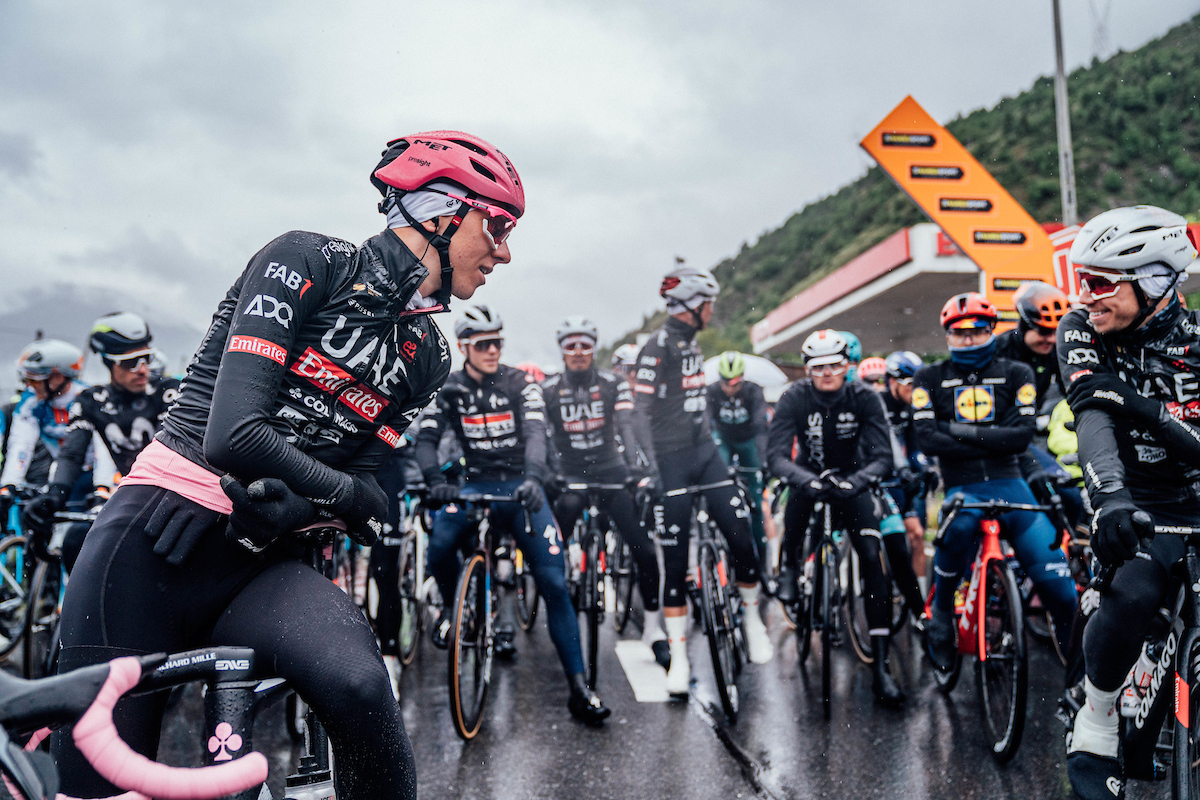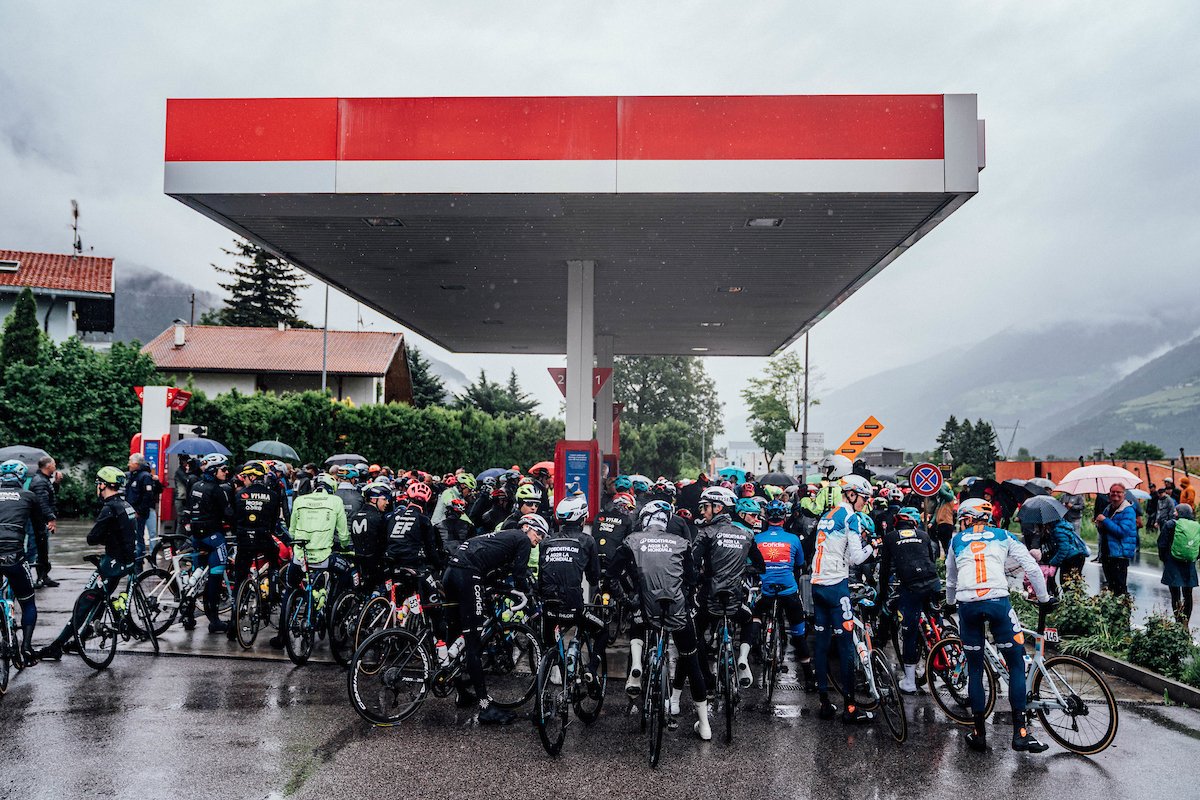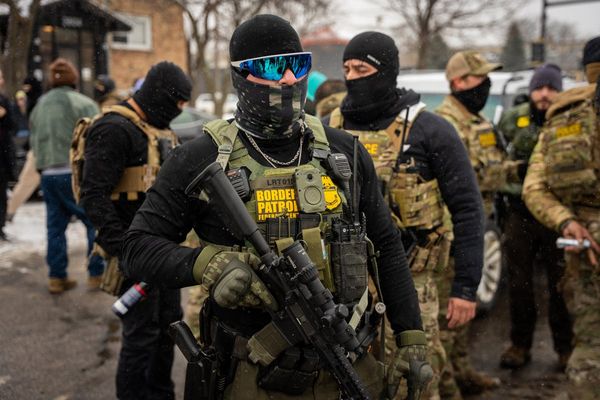
Snow was general on the mountains above Livigno on Tuesday morning. It was falling softly atop the Passo di Eira and falling softly over the Passo di Foscagno. When word of the similarly miserable conditions on the Umbrail Pass filtered through to the start, an understandably mutinous wave began to spread across the Giro d’Italia peloton.
It seemed self-evident that the Cima Coppi of the Giro would have to be excised from the route, in accordance with the agreement brokered by riders’ association, the CPA, in their meeting with RCS Sport, the UCI and the teams’ association during Monday’s rest day.
During that meeting, it had been agreed that the stage would be shortened if the grim previsions for the following morning’s weather proved correct. If anything, the most pessimistic forecast had understated the conditions.
RCS Sport, however, were in a vacillating mood, and not for the first time. For those present in Morbegno in 2020 or Sacile in 2021, when similarly late alterations were made to the course, there was a distinct sense of déjà vu about the chaotic scene here.
As the minutes ticked down towards the planned start time and a sleety rain washed over Livigno, riders signed on and then huddled beneath canopies still unsure if they would ride over the Umbrail Pass, and still with no clear information about the start time. Team vehicles circled the town, waiting for orders to twist or stick.
The breakdown in communications was total. Along the course, police officers were stopping journalists’ cars to inquire if they had any idea whether the race would be passing their way after all.
Eventually, after the planned start time had already been and gone, RCS Sport announced that the gruppo would not climb the Umbrail Pass, and that the race would instead be reduced in length, starting from Prato allo Stelvio.
Ordinarily, that would have been the end of the matter, only for RCS Sport’s diktat that the peloton would also ride a neutralised section of 18km from Livigno to the tunnel at Munt Raschera, where they would then climb into team cars and drive to the new start line.
RCS Sport managing director Paolo Bellino confirmed, however, that as late as 10am local time on Tuesday morning, the organisers had been trying to compel the bunch to ride over the Umbrailpass and then take an agreed pause to change into warm weather clothing for the long descent.
The idea – ‘option two’ of the three discussed by the UCI, RCS and the CPA – had already seemed fanciful on Monday afternoon. It was utterly preposterous amid the reality of Tuesday’s conditions, yet it was being seriously entertained minutes before the start.
“Today we decided as a commission, with the only vote against coming from the riders, that we wanted that option. That was at 10 o’clock,” Bellino said. “With the weather, we now hear the conditions are impossible, so we are moving the race to Prato allo Stelvio, but we have the agreement with the riders to start from here, to ride to the tunnel not far from here and then move to Prato allo Stelvio.”
Race director Mauro Vegni’s hope was that the new configuration would be a compromise between safeguarding the riders’ health and ensuring RCS Sport collected a full purse from the start town Livigno, who had already shelled out to host the finish of stage 15.
“I think that what we did is the right compromise between what they wanted and what we would have liked,” Vegni said. “It satisfies all local authorities. Livigno paid to have this event, so you always have to find the right compromise.”
The Giro peloton, however, balked at the idea of taking on a half-hour procession on empty roads beneath driving rain to satisfy the conditions of the contract between RCS Sport and Livigno. That kind of thing has always been a part of how cycling’s curious financial ecosystem functions, but on Tuesday, it felt like an absurd addendum to an easily avoidable situation.
“If we have to ride the first 50k neutralised then we aren't going to start,” said Michael Valgren (EF Education-EasyPost), and the Dane was far from alone in his stance. En masse, the Giro gruppo climbed into team vehicles and set off for the new start line in Lasa. At the original partenza in Livigno, the mayor stood on ceremony with a flag, but no peloton to wave off.
Avalanche

Tuesday’s polemic – “a delirium foretold,” per Tuttobici’s Cristiano Gatti, had been building for some time, but if RCS Sport weren’t ignoring the warnings, then they were quietly hoping the problem would just go away.
The end result was the same: confusion and chaos at the start, posturing and polemics at the finish.
A little under two weeks ago, the local avalanche commissioner in Bolzano had already warned that stage 16 would not be able to cross the Passo dello Stelvio due to the risk posed by the rapidly melting snow banked above the road. RCS Sport declined to make any public statement at that point, but privately, the race organiser was of the view that it was still too soon to make a definitive call on the matter.
Four days later, RCS Sport announced that top of the Stelvio had indeed been excised from the route, with the gruppo instead climbing part of the way before descending via the Umbrail Pass. At that point, the organisation clearly hoped they had resolved the problem ahead of time. As it turned out, the can had merely been kicked further down the road.
And yet, in the Extreme Weather Protocol meeting on Monday afternoon, the only decision taken was to delay the decision still further, despite the unanimity of the Giro peloton on the matter.
Monte Pana
In the middle of it all, a bike race broke out, just as it did three years ago, when Egan Bernal all but sealed overall victory by winning over the Passo Giau on the snow-shortened Dolomite tappone. That win should have silenced the polemics. But it didn’t, of course.
And it was a similar scenario here, even though maglia rosa Tadej Pogačar powered to his fifth stage win of this Giro at the end of a shorter but very keenly contested 118km to Monte Pana, played out beneath driving rain and in plummeting temperatures.
While riders, teeth chattering, were making their way through the finish area, Bellino was sitting on the platform of RAI’s 'Processo alla Tappa' post-race analysis show, spoiling for an argument after the Giro gruppo had defied the request to ride additional processional kilometres to placate the mayor of Livigno.
“We said, ‘do us a favour, ride the 12km to the tunnel, then get into the cars'. That’s why the mayor of Livigno was waiting on the start line,” Bellino said. “I was very shocked that the riders still didn’t turn up. I am the organiser, and I was being told on social media that I don’t have ability to do it. Well, I would like to see who could solve this. Either we follow the rules and apply them or else we find new rules.”
The CPA representative at the Giro, Cristian Salvato, was invited onto the Processo platform to offer his body’s version of events, but viewers were unfortunately unable to hear them in full due to the frequent, intemperate interruptions of Bellino, not to mention the intermittent mansplaining of host Alessandro Fabretti. A delirium foretold, indeed.
“I’m not making a polemic, but are you in agreement that we had agreed everything, including the 12km neutralised section?” Bellino asked Salvato. “We shook hands, and we signed a protocol.”
Salvato, too, insisted that he didn’t want a polemic, but he would scarcely have managed to get a word in even if he had. He managed to explain that he had gone to speak to the riders at the team cars before he was interrupted. Later, he echoed the point outlined by Pogačar and others, namely that the decision to ride a neutralised section had been taken too late to sort out the logistics in any satisfactory way.
“I’m sorry the lads didn’t do it,” Salvato said. “But the lads, like Pogačar said, had very few team cars with them, so they would have had no way to change [after the neutralised section].”
The end credits began to roll before the discussion had even truly begun, far less reached a conclusion, but perhaps that was an appropriate way to bring the curtain down on the whole charade.
The elephant in the room, of course, was RCS Sport’s decision to try to bring the race to an altitude of 2,758m in late May in the first place. With the climate crisis ever more evident, it seems ever more obvious that the Giro will either have to forgo higher altitudes in the future or else lobby the UCI to shift the race to a later date on the calendar.
For that to happen, Bellino and company will have to make their case rather more coherently than they did on Tuesday. In the meantime, the Giro is slated to climb above 2,000m again in the opening kilometres of stage 17, with the climb – and long descent – of the Passo Sella on the menu.
Get unlimited access to all of our coverage of the Giro d'Italia- including journalists reporting, breaking news and analysis on the ground from every stage of the race as it happens and more. Find out more.







